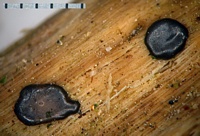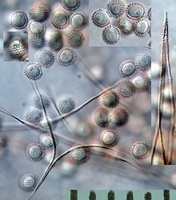|
 Dianema depressum Dianema depressum
SynonymsCornuvia depressa
BiostatusPresent in region - Indigenous. Non endemic
Images (click to enlarge)
Owner: J.A. Cooper | 
Owner: J.A. Cooper |
Article: Stephenson, S.L. (2003). Myxomycetes of New Zealand. Fungi of New Zealand. Ngā Harore o Aotearoa 3: xiv + 238 p. Hong Kong: Fungal Diversity Press.
Description: Fruiting body a plasmodiocarp, flattened pulvinate to broadly effused, 2–10 mm in the longest dimension, very thin, 0.2–0.3 mm, rarely sporangiate on a constricted base, grey-brown, glossy. Peridium membranous, smooth or obscurely reticulate, translucent yellowish grey or drab, marked on the inner side with the persistent attached ends of the capillitial clusters. Capillitium usually abundant, consisting of pale yellowish grey threads, 1–2 µm thick, triangular in cross section, each angle bearing a row of minute tubercles, united above and below into clusters of mostly 2–6 threads, at length breaking away as an elastic web. Spores mostly free, pale lilaceous grey in mass, pallid by transmitted light, the greater part of the surface covered with a delicate, rather close reticulation, 7–9 µm in diameter. Plasmodium white or rosy.
Habitat: Decaying wood.
Distribution: Known from widely scattered localities in Europe and North America (Martin & Alexopoulos 1969) and also reported from Asia (Yamamoto 1998) and Australia (Cheesman & Lister 1915). First reported from New Zealand by Rawson (1937), based on a specimen collected in South Canterbury. Also known from Otago Lakes (Stagg 1982).
Notes: This is the only species of Dianema with reticulate spores, a feature that makes identification relatively easy.
|